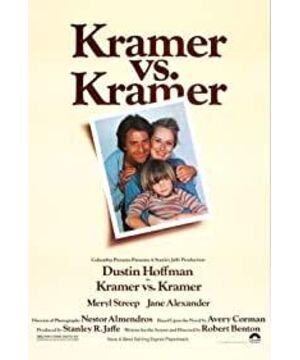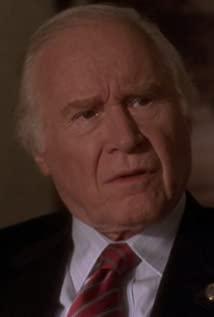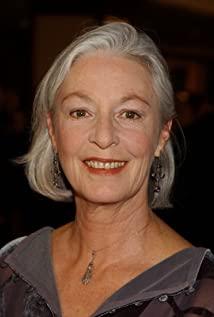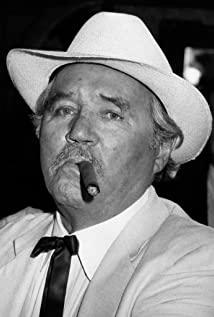The film begins with Mrs. Kramer's sad face as she says to his son: I love you, Billy. Then there's the scene where she starts packing. Then Mr. Kramer, who was on the field, talked to him about his latest job in high spirits, and his boss hinted that he was about to be promoted. When he got home, when his wife told him, I'm leaving you, he naturally ignored her and continued on the phone to talk about his work. At this time, Mr. Kramer only saw his job, and his son and wife only accounted for a very small part of his life. Mrs. Kramer's life was entirely in the shadow of her husband, with only her son, and her husband who often ignored her. Her departure was not a momentary, but an outburst of long-term repression.
So Mr. Kramer took on the dual responsibility of caring for his son and providing for his family.
Mr. Kramer, who just started, is really not a good father. He doesn't know what grade his son is in, and he will lose his temper with his son because the child affects his work. But in the end, his heart was full of his son. He remembered every request of his son, and he would keep talking about his son while eating with the leader.
Dustin Hoffman's acting skills are of course needless to say. He has always tried to show his optimism towards his son, and all his performances are very natural. When he is at work, he is casually dealing with his son when he calls him ahhhhhhhhhhhhhhhhhhhhhhhhhhhhhhhhhhhh. The leader forced a calm laugh when talking about his wife's departure, and when he listened to his lawyer's question to his ex-wife in court, his eyes were three-point reproach, three-point helplessness, three-point guilt, and the silent "No. ". Especially when he was chatting with the boss about Billy, everything was very natural, just like a new father who kept bringing all the topics to his son when he was eating with his family, no matter what. Whether the person listening to it is interesting or not, his face is full of happiness, but the ordinary can no longer be ordinary. And when I made breakfast for my son for the first time, I knew nothing, but still pretended to be relaxed, and while making a mess in the kitchen, I said to my son, "Look, it's no big deal." It's both funny and true. He also won the 52nd Academy Award for Best Actor for this film. This is said to be "unreliable in appearance", but I think the performance of a very fanciful actor in "Rain Man" and "The Graduate" is also commendable. In "Rain Man", he has always behaved eccentrically. , Raymond, an autistic patient with dementia, he is also very difficult to control.
At first, I watched this movie for Meryl Streep. The powerful aura of the woman who played the editor-in-chief in "The Devil Wears Prada" completely stunned me, and some comments wrote " After arriving in Miranda, Streep accomplishes the almost impossible task of creating an atmosphere that is about to happen: something out of the ordinary is about to happen. As the film progresses, her The image has grown even higher, and an unforgettable shot is a close-up of him saying nothing, just pouting, with the power of an Olympian thunderbolt, even though the excesses are against cost-effectiveness." Milan Da scolded Andy for deliberately lowering his voice, and sighed after telling about his failed marriage with a tired face, and instantly changed into the queen style who was calling the wind and the rain in the office, making such a Hollywood commercial film also because of Her acting was up a notch. Meryl Streep's share in "The Kramers" is small, focusing on the court scene in which she fights for custody of her son, with her composure and composure as she answers questions from her lawyer. Coherently, when she was asked by her ex-husband's lawyer about their marriage, she was flustered and unconfident, looked at her ex-husband with red, tearful eyes, and deliberately avoided the direct gaze of her friend when she testified in court. A series of actions are just right, and the subtext in the actions makes the audience intuitively feel Mrs. Kramer's guilt for abandoning her family and her determination to win back her son from her ex-husband. Mrs. Kramer was not a courageous and confident woman. Even after receiving treatment from a psychiatrist, she could not become another person. Streep skillfully struck the balance between them and let Clay Mrs. Mo dared to raise the child with her ex-husband alone, and dared to face the judge lawyer and her ex-husband in court, but when she first met her ex-husband and proposed to raise the child, Mr. Kramer said, "Don't tell me what to do, don't. Talk to me like that." He covered his mouth with his frightened hands, trembling with fear from Mr. Kramer's broken wine glass.
There is also a role that cannot be ignored in the film is Justin Henry who plays Billy. At the beginning, Billy kept asking his father, "Where is mom, where is mom." Then he gradually got used to only his father. life. This is a well-behaved little boy who didn't cry or make trouble when his father made such a bad breakfast for the first time, bowed his head and said "I'm sorry" when he overturned the drink and was scolded by his father. However, children are children after all. Adults can't face their relatives and walk away. How can children accept it? Before receiving the letter from his mother, Billy kept asking where his mother was and what was his mother? When you come back, when Dad said "I guess your mother will write this week", he immediately asked "when will she be back", but in the letter, my mother said that I can't be your mother at home, but I can When your heart is your mother, the children are naturally sad and turn up the volume of the TV to tell their father "I don't care".
How could he not care, this is the heart of the little guy must be sad, "Why did my mother who used to love me so much leave me? It's not that I don't care, I don't want to listen to it anymore, but Mom, even if you really don't love me anymore I will miss you too. I took your picture out of the box my dad kept because I wanted to see you all the time. My birth dad was 20 minutes late and didn't come to pick me up because of you It's never been like this, and I'm more afraid that my dad doesn't want me like you, because I'm not good. So I deliberately skipped dinner, deliberately angered my dad, I said I hated him, I said I just want my mother, but It's not true, so I asked him, Dad, will you leave me, will Mom leave me because I'm not good, Dad's answer I only know a little bit, but I see tears in the eyes of Dad who has never cried , I know that my father loves me very much, and he will not leave me, so mother, I love my father as much as I love you now. Every day from now on, I will wake my father up and make breakfast with my father, I read the newspaper while eating breakfast like my dad. My dad would listen to the funny things I said and would take me to the playground. My dad was a very strong man. He didn’t cry when I was hurt. He always comforted me when I stitched the wound, telling me to be good and brave. I am no longer afraid of walking into the classroom from the school gate alone, and I am no longer afraid of riding a bicycle. I am really reluctant to leave my father now."
At the end of the film, after Mr. Kramer told Billy that he was going to live with his mother in the future, Billy didn't look surprised, he asked "Where should I move my bed and where should I sleep?" "Then my Where are the toys?" "Who's going to read me a bedtime story?" "Then you won't say goodnight to me, will you?" Billy was still accustomed to Mr. Kramer's answer to the first three questions. Some were well-behaved and sensible, until the last question, when Dad still said "No, I can't" in a relaxed attitude, Billy couldn't help crying. At that time, in Billy's heart, Dad's status was far away far higher than my mother. So I was sitting on the sofa at home holding a toy and waiting for my mother to pick him up like a doomsday, silently nodding with tears and telling my father that he was ready.
Then the structure of the film is like a full stop. At the beginning, Mrs. Kramer takes the elevator to leave, and at the end she takes the elevator to return home. However, at the beginning and the end, the elevator door is closed, blocking the eyes of the couple. It also implies that the eight-year husband and wife relationship between the two was cut off. Perhaps the film also wants to tell us that although the relationship between the two has eased, it is impossible for them to remarry and live together again.
This is a film with a normal narrative and no ups and downs, but it moved me very much. The director of the film is a screenwriter, so he is very clever in handling the subtext, plus none of the actors are idols who rely on appearance. , let this film write the various contradictions in the American family in the 1980s in the ordinary. Women are no longer willing to play the role of housewives, husbands can't ignore the family just because of their work, and the love that parents have for their children, and the children's love for their parents, are all what this film wants to express. The truth in the ordinary may be the most successful place for this film.
View more about Kramer vs. Kramer reviews











